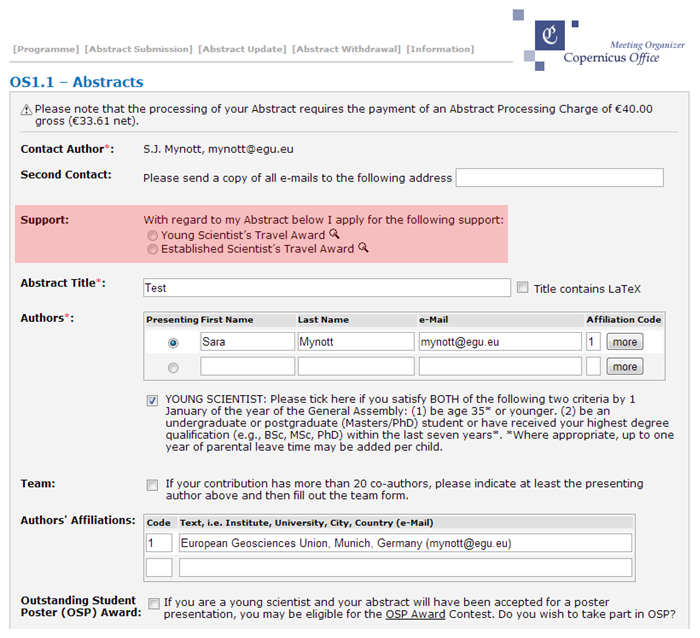A limited amount of the overall budget of the EGU General Assembly is reserved to assist young scientists and established scientists from low and lower middle income countries who wish to present their work at the meeting. From 2005 to 2013, the total amount awarded grew from about €50k to €90k. For the 2014 General Assembly, the EGU has allocated €110k for financial support for scientists to attend.
Financial support may include a waiver of the registration fee and a refund of the Abstract Processing Charge (relating to the abstract for which support was requested). Additionally, the grant may include support for travel expenditures. The EGU currently runs two different financial support schemes; you will be able to find more details about each of these awards on the Support & Distinction section on the EGU 2014 website.
Scientists who wish to apply for financial support should submit an abstract, on which they are first authors, by 29 November 2013. Late applications, or applications where the scientist is not the main author, will not be considered.
To submit the abstract of your oral or poster presentation, please enter the Call-For Abstracts page on the EGU2014 website, select the part of the programme you would like to submit an abstract to, and study the respective session list. Each session shows the link to Abstract Submission that you should use. More information on how to submit an abstract is available from the EGU 2014 website.
To apply for financial support, make sure you click the appropriate box when submitting your abstract. Bear in mind that, even if you are applying for support, you will still need to pay the Abstract Processing Charge. A screenshot of the first screen of the abstract submission process is shown below; the support application section is just above the Abstract Title box.

The abstract submission page (click for larger). If you wish to apply for financial support, please select one of the support boxes highlighted here.
The selection process follows the following steps:
- The first and most important step, after the submission deadline, corresponds to the evaluation made by the session convener and/or co-conveners. The ranking is based on the scientific quality of the contribution and the quality of the abstract. The conveners are also able to add comments highlighting special circumstances.
- The second step corresponds to the decision made by the EGU programme groups which is based, on a first instance, on the convener’s evaluation and favourable comments. The role of the Programme Groups is to ensure continuity between their respective sessions.
- In the third and final step, the Treasurer/Finance Committee grants travel support within the overall annual budget allocation, taking into account the evaluations and comments of conveners and programme groups, the number of abstracts submitted by each session, and the number of registered participants by country (estimated based on previous-year numbers). Between 40 and 55% of the travel grants will go to participants of low income countries.
Next year’s financial-support awardees will be notified in early January 2014. If you have any questions about applying for financial support, please contact EGU communications Officer, Sara Mynott.
